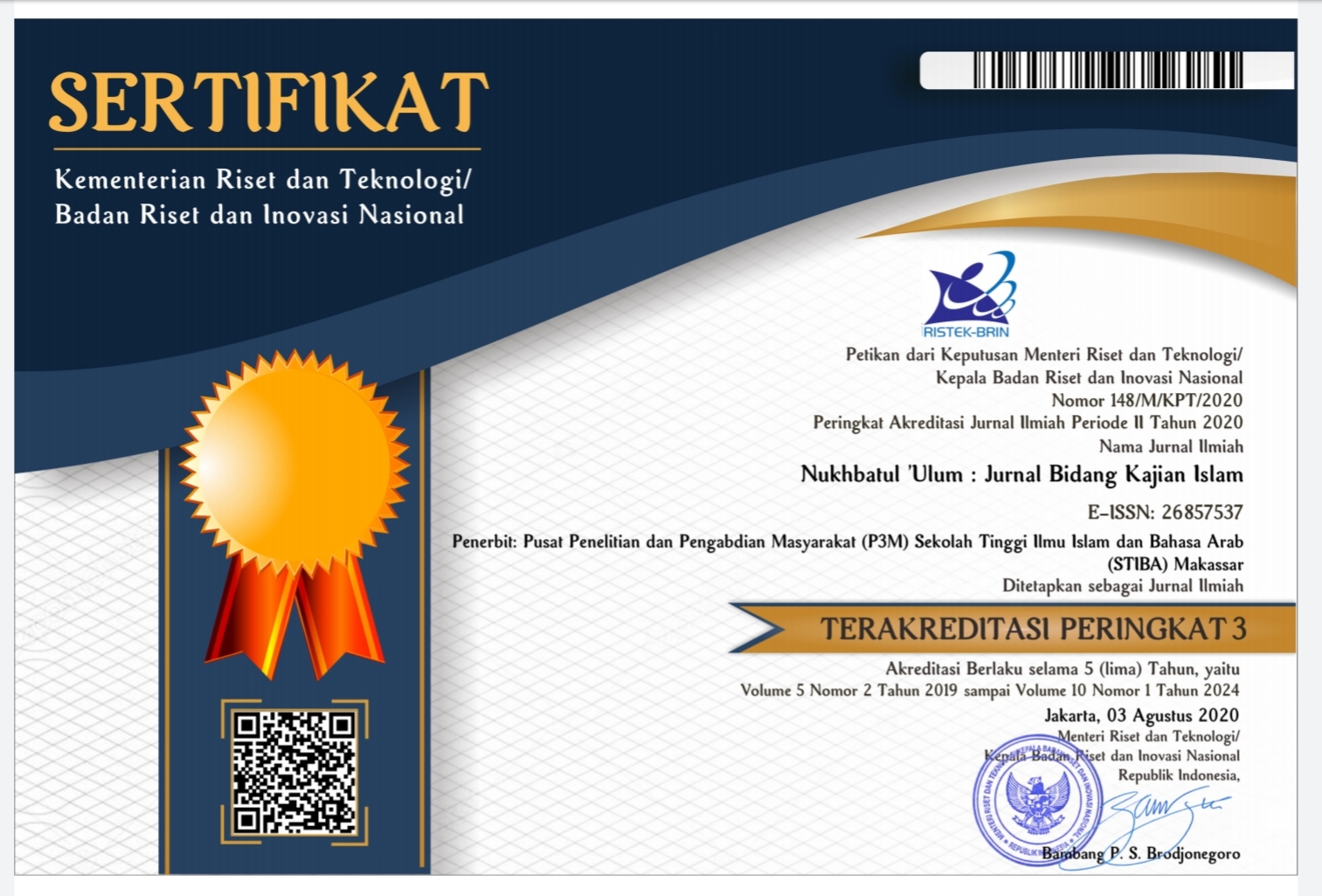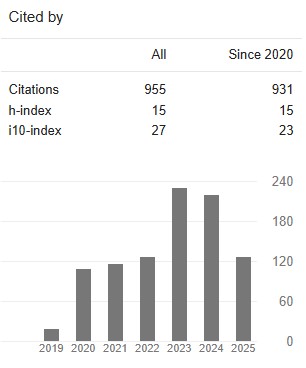Forced Divorce Polemic: Comparative Analysis of the Hanafi and Shafii Schools of Thought
DOI:
https://doi.org/10.36701/nukhbah.v10i1.1073Keywords:
comparative, istinbath, forced divorceAbstract
This article aims to summarize the views of the Hanafi and Shafii madhhabs regarding the status of divorce of a person who is forced and the method of determining it, as well as to find out the method of scholars in tarjīḥ opinion between the Hanafi and Shafii schools in this case. To get answers to the problems, this article uses library research that focuses on manuscript and text studies, using case and comparative approach methods. By looking at some coercive ḍawābiṭ, the results of the study found that; First, the Hanafis argue that divorce imposed by a person who is forced is legal, because here he faces two tough choices, namely divorcing his wife or receiving threats from the person who forced him, and in fact, he chooses to divorce his wife. In contrast to the Shafii school of thought, which is not consider valid, because divorce is an absolute right for the husband alone, also because Allah has aborted disbelief in those who are forced to disbelieve. The istinbāṭ method of the law used by the Hanafi and Shafii schools is that they both use kias. Second, the scholar's method in tarjīḥ the opinion between the Hanafi school and the Shafii school regarding forced divorce is by looking at the sanad hadith. In this case, the majority of scholars further strengthen the hadiths used as evidence by the Shafii school because they see the ṡīqāh (trusted) narrators of hadith so that all of their narrators can be used as evidence.
Downloads
References
‘Abdul Wahhāb Khalāf. ’Ilmu Uṣūl Al-Fiqh. Edited by Maktabah al-Da’wah al-Islāmiyyah. 2nd ed. Kairo, 2000.
‘Abdullāh bin ‘Abdurraḥmān al-Bassām. Tauḍīḥ Al-Aḥkām Min Bulūgi Al-Marām, Juz 5. 5th ed. Makkah: Maktabah al-Usarī, 2003.
‘Abdullāh bin Maḥmūd al-Mūṣulī. Al-Ikhtiyār Lita’līl Al-Mukhtār, Juz 3. 1st ed. Beirut: Dār al-‘Ilmiyah, 1996.
‘Alāi al-Dīn al-Samarqandī. Tuḥfatu Al-Fuqahāi, Juz 2. 1st ed. Beirut: Dār al-Kutub al-‘Ilmiyyah, 2000.
‘Alī bin Muḥammad al-Syarīf al-Jurjānī. Al-Ta’rīfāt. 1st ed. Beirut: Maktabah Libanān, 1999.
‘Izzu bin ‘Abd al-Salām. Al-Gāyah Fī Ikhtiṣār Al-Nihāyah, Juz 5. 1st ed. Beirut: Dār al-Nawādir, 2018.
’Abdurrahman bin Abi Bakrin Al-Suyūṭī. Al-Asybāh Wa Al-Naẓāir. 1st ed. Beirut: Dār al-Kutub al-‘Ilmiyah, 2000.
Abd. Karim Faiz, Zulfahmi, Ahmad Izzudd. “Between State Law and Islamic Law: The Practice of Divorce Outside the Situbondo Religious Courts, Indonesia.” JIL: Journal of Islamic Law 3, no. 2 (2022): 176–92. https://doi.org/10.24260/jil.v3i2.848.
Abū Bakr bin ‘Alī al-Zabīdī. Al-Jawāhir Al-Nairah, Juz 2. 1st ed. Beirut: Dār al-Kutub al-‘Ilmiyah, 2006.
Al-‘Asqalānī, Ibnu Ḥajar. Fatḥ Al-Bārī, Juz 2. 1st ed. Beirut: Dār al-Ma’rifah, 2000.
Al-Bābartī, Akmal al-Dīn. Al-‘Ināyah Syarḥu Al-Hidāyah. 3rd ed. Lebanon: Dār al-Fikr, 2000.
Al-Baiḍāwī, Nāṣirudin Abī Sa’īd ‘Abdullāh bin ‘Umar al-Syairāzī. Tafsīr Al-Baiḍāwī, Juz 2. 1st ed. Beirut: Dār al-Rasyīd, 2000.
Al-Baʼdānī, Muhammad ʻAlī. Ṭalāq Al-Mukrah. 2nd ed. Kairo: Dār al-Wafāi, 2014.
Al-Bukhārī, Muḥammad bin Ismā’il. Ṣaḥīḥ Al-Bukhārī. 1st ed. Kairo: al-Dār al-‘Alamiyyah, 2016.
Al-Dimasyqī, Muḥammad al-Ḥusainī al-Ḥuṣnī. Kifāyatu Al-Akhyār, Juz 2. 1st ed. Beirut: Dār al-Khair, 1999.
Al-Garnāṭī, Muḥammad bin Aḥmad bin Juzā. Al-Qawānīn Al-Fiqhiyyah, Juz 1. 1st ed. Beirut: Dār Ibn Ḥazm, 2002.
Al-Gazālī, Abū Ḥāmid. Al-Wasīṭ Fī Al-Mażhab, Juz 5. 2nd ed. Mesir: Dār al-Salām, 2005.
Al-Gazālī, Muḥammad bin Muḥammad bin. Al-Wajīz Fī Fiqh Al-Imām Al-Syāfi’ī, Juz 2. 2nd ed. Beirut: Dār al-Arqam, 2001.
Al-Ḥarrānī, Taqiyyu al-Dīn Aḥmad bin Taimiyah. Majmu’ah Al-Fatāwā, Juz 33. 2nd ed. Mesir: Dār al-Wafāi, 2001.
Al-Jazīrī, Abdurrahman. Al-Fiqh ʻAlā Mażāhib Al-Arbaʼah, Juz 4. 2nd ed. Beirut: Dār al- Kutub al-Ilmiyah, 2003.
Al-Karmī, Mar’ī bin Yūsuf bin. Gāyah Al-Muntaha Fī Al-Jami’ Baina Al-Iqnāʼ Wa Al- Muntaha, Juz 3. Kuwait: Muassasah Girās li Nasyri wa al-Tauzīʼ, 2007.
Al-Kāsānī, Alāuddīn Abū Bakr bin Masʼūd. Badāi’ Al-Ṣanāi’ Fī Tartib Al-Syarāi’. 1st ed. Beirut: Dār al Kitāb al ‘Arabī, 2000.
Al-Kāsānī, ʻAlāuddīn Abū Bakr bin Mas‟ūd. Badā`i’ Al-Ṣanā`i’ Fī Tartīb Al- Syarā`i’. 2nd ed. Beirut: Dār al-Kutub al-Ilmiyah, 2003.
Al-Kāsānī, ʻAlāuddīn Abū Bakr bin Masʼūd. Badāiʼ Al-Ṣanāiʼ Fī Tartib Al-Syarāiʼ. 2nd ed. Damaskus: Dār al- Kutub al-Ilmiyah, 2002.
Al-Mālikiyyah, Khalīl bin Isḥaq. Mukhtaṣar Al-‘Allāmah Al-Khalīl. 2nd ed. Beirut: Dār al-Fikr, 2000.
Al-Mardāwī, Uṡmān bin Aḥmad ‘Auḍ. Hidāyah Al-Rāgib Li Syarḥ ‘Umdatu Al-Ṭālib. 1st ed. Beirut: Muassasah al-Risālah, 2007.
Al-Margīnānī, Alī bin Abī Bakr. Al-Hidāyah Syarḥu Bidāyah Al-Mubtadī, Juz 3. 3rd ed. Pakistan: Idārah al-Qur‟an wa al-„Ulūm al-Islāmiyah, 2003.
Al-Margīnānī, Burhānuddīn Abū al-Ḥasan Alī bin Abī Bakr. Al-Hidāyah Syarḥu Bidayah Al-Mubtadī, Juz 3. 1st ed. Pakistan: Idārah al-Qur’an wa al-‘Ulūm al-Islāmiyah, 2001.
Al-Namlah, ‘Abdul Karīm ibn ‘Alī ibn Muḥammad. Al-Mażhab Fī ‘Ilmi Uṣūl Al-Fiqh Al-Muqāran, Juz 1. 1st ed. Riyad: Maktabah al-Rusyd, 2001.
Al-Nawawī, Abī Zakariyyā Yaḥyā bin Syaraf. Rauḍatu Al-Ṭālibin Wa ‘Umdah Al-Muftīn. 2nd ed. Damaskus: Dār al- Kutub al-Ilmiyah, 2010.
Al-Nawawī, Yaḥyā bin Syaraf. Rauḍatu Al-Ṭālibin Wa ʻUmdah Al-Muftīn, Juz 8. 3rd ed. Beirut: Maktab al-Islāmī, 2004.
Al-Sa’dī, Abdurraḥman bin Nāṣir. Taisīr Al-Karīm Al-Raḥman Fī Tafsīr Kalām Al-Mannān. 1st ed. Beirut: Muassasah al-Risālah, 2002.
Al-Sakhāwī, Syamsu al-Dīn Abū al-Khair Muḥammad bin ‘Abdurraḥman. Al-Maqāṣidu Al-Ḥasanah. 1st ed. Beirut: Dār al-Kutub al-‘Ilmiyah, 1998.
Al-Ṣan’ānī, Muḥammad bin Ismā’il al-Amīr. Subul Al-Salām Syarḥu Bulūgul Marām, Juz 1. 1st ed. Mesir: Dār al-Ḥadīṡ, 1999.
Al-Sarkhasī, Syamsu al-Dīn. Al-Mabsūṭ. 1st ed. Libanon: Dār al-Ma’rifah, 1999.
Al-Sijistānī, Abū Dāwud Sulaimān bin al-Asy’ats. Sunan Abī Dāwud, Juz 2. 2nd ed. Beirut: Dār al-Kutub al-‘Ilmiyah, 2000.
Al-Syarībīnī, Syamsu al-Dīn. Mugnī Al-Muḥtāj Ilā Ma’rifaḥ Ma’anī Al-Fāẓ Al-Manhāj. Cet. I. Beirut: Dār al-Ma’rifaḥ, 1997.
Al-Syīrāzī, Abū Isḥāq. Al-Muhażab Fī Fiqh Al-Imām Al-Syāfi’ī, Juz 4. 1st ed. Damaskus: Dār al-Qalam, 2000.
———. Al-Muhażab Fī Fiqh Al-Imām Al-Syāfi’ī, Juz 4. 2nd ed. Damaskus: Dār al-Qalam, 2000.
Al-Taftāzānī, Sa’d al-Dīn. Syarḥ Al-Tauḍīḥ ‘ala Al-Tanqīḥ, Juz 2. 1st ed. Beirut: Dār al-Kutub al-‘Ilmiyah, 1998.
Al-Tirmiżī, Muḥammad bin Īsa. Sunan Al-Tirmiżī, Juz 2. 1st ed. Beirut: Dār al- Garb al-Islāmī, 2002.
Al-Zuḥailī, Wahbah. Al-Fiqh Al-Islāmī Wa Adillatuhu, Juz 9. 2nd ed. Damaskus: Dār al- Fikr, 1995.
Asli, Mehrdad Rayejian, and Mojgan Amrollahi Byouki. “Forced Marriage in Islamic Countries: The Role of Violence in Family Relationships.” In Women and Children as Victims and Offenders: Background, Prevention, Reintegration, 1:729–53. Springer International Publishing, 2016. doi:10.1007/978-3-319-08398-8_26.
Bakr, ’Uṡmān bin Syaṭā al-Bakrī Abū. I’ānatu Al-Ṭālibīn, Juz 4. 1st ed. Kairo: Dār Iḥyāi al-Kutub al-‘Arabiyah, 1998.
Bremmer, Dale, and Randy Kesselring. “Divorce and Female Labor Force Participation: Evidence from Times-Series Data and Cointegration.” Atlantic Economic Journal 32, no. 3 (2014): 175–90. doi:10.1007/BF02299436.
Carlisle, Jessica. “Mother Love: A Forced Divorce in Damascus.” Berghahn Journals; New York Oxford 2, no. 1 (2017): 178–97. doi:10.3167/ame.2007.020107.
Fernández, Raquel, and Joyce Cheng Wong. “Divorce Risk, Wages and Working Wives: A Quantitative Life-Cycle Analysis of Female Labour Force Participation.” The Economic Journal 124, no. 576 (2015): 319–58. doi:10.1111/ECOJ.12136.
Gul, Ayesha, Shereen Younas Khan, Rukhshandazarar, Soniya Shmas, and Muhammad Humayun. “Divorce: Cuses and Consequences in Islamic Pperspective.” PalArch’s Journal of Archaeology of Egypt / Egyptology 18, no. 4 (2021): 6136–51.
Hidayati, Tri Wahyu, Ulfah Susilawati, and Endang Sriani. “Dynamics of Family Fiqh: The Multiple Roles of Women in Realizing Family Resilience.” Ijtihad : Jurnal Wacana Hukum Islam Dan Kemanusiaan 22, no. 2 (2022): 219–38. doi:10.18326/ijtihad.v22i2.219-238.
Ibrāhīm bin ‘Alī bin Yūsuf al-Fairūz Bādī al-Syīrāzī. Al-Tanbīh Fī Al-Fiqh Al-Syāfi’iyyah. 1st ed. Beirut: ‘Ālam al-Kutub, 1998.
Indonesia, Ministry of Religion of the Republic of. Al-Qur’an and Translation. 1st ed. Bandung: Cordoba, 2018.
Jaliansyah, Martina Purna Nisa. “Critical Review of Domestic Violence as Reason for Divorce (Comparison of Divorce Laws in Indonesia, Malaysia and the Maldives).” Al-Ihkam: Jurnal Hukum Dan Pranata Sosial 16, no. 1 (2021): 1–23. doi:10.19105/al-lhkam.v16i1.4292.
Jamhuri, and Zuhra. “Konsep Talak Menurut Ibnu Qayyim Al-Jauziyah (Analisis Waktu Dan Jumlah Penjatuhan Talak).” Media Syari’ah 20, no. 1 (2018): 96–122. doi:10.22373/jms.v20i1.6503.
Kadir, N. A. “Evaluating The Rising Trends of Divorces Within Malaysian Community.” Quantum Journal of Social Sciences And Humanities 2, no. 6 (2021): 1–13. doi:10.55197/qjssh.v2i6.96.
Kamāl ibn al-Sayyid Sālim. Ṣaḥīḥ Fiqh Al-Sunnah Wa Adillatuhu Wa Tauḍīḥ Mażāhib Al-Aimmah, Juz 3. 1st ed. Kairo: al-Maktabah al-Taufīqiyyah, 2003.
Kartini, Kartini. “Maqasid Al-Shari’ah Perspectives in Solution of Divorce Cases for Early Marriage.” International Journal of Health Sciences, August 15, 2022, 8685–97. doi:10.53730/ijhs.v6ns5.11775.
Kaṡīr, Abū al-Fidā’ bin. Tafsīr Al-Qur’an Al-‘Aẓīm. 1st ed. Beirut: Dār Ibn Ḥazm, 2000.
Kasman Bakry, Sirajuddi, Musriwan, Ahmad Arfah Mansyah. “Tinjauan Fikih Islam Terhadap Undang-Undang Nomor 1 Tahun 1974 Tentang Talak.” BUSTANUL FUQAHA: Jurnal Bidang Hukum Islam 2, no. 2 (2021): 348–62. doi:10.36701/BUSTANUL.V2I2.374.
Khairani Mukdin, Zahrul Bawady, Tarmizi M.Djakfar, Muhammad Riza Nurdin. “Application of No-Fault Divorce Legalrules As A Basic For Judges Conciderations; A Case Study of Indonesia.” Pelita: Jurnal Kajian Ilmu Hukum Dan Syariah 7, no. 2 (2022): 80–91. doi:10.22373/petita.v7i2.149.
Khaṭṭāb, Al-Ruʻainī al-Syahīr bil. Mawāhib Al-Jalīl Fī Syarḥ Mukhtaṣar Al-Syaikh Khalīl, Juz 4. 1st ed. Maurītāniyā: Dār al-Riḍwān, 2010.
Lawang, Karimuddin Abdullah, Rika Sasralina, Darwin Sagala, J Jalaluddin, and Titin Samsudin. “Woman Representative in Divorce: An Analysis Form Syafi’iyyah Fiqh.” Athena: Journal of Social, Culture and Society 1, no. 2 (March 15, 2023): 43–49. doi:10.58905/athena.v1i2.31.
Leopold, Thomas. “Thomas Leopold, Gender Differences in the Consequences of Divorce: A Study of Multiple Outcomes, Demography 55 No. 3.” Demography 55, no. 3 (2018): 769–97. doi:10.1007/s13524-018-0667-6.
Mahmudin. “Ikrah (Paksaan) Dalam Perspektif Hukum Islam.” Al-Falah 20, no. 2 (2020). doi:10.47732/alfalahjikk.v20i2.144.
Maimun. “The Women’s Rights in Divorce and Gender Equality Discourse in The Dynamics of Divorce in Madura.” Samarah: Jurnal Hukum Keluarga Dan Hukum Islam 6, no. 1 (2022): 468–92. doi:10.22373/sjhk.v6i1.12804.
Mājah, Muḥammad bin Yazīd al-Qazwīnī Ibnu. Sunan Ibnu Mājah. 1st ed. Kairo: Ibnul Jauzi, 2014.
Maula, Wardah Nuroniyah and Bani Syarif. “Muslim Women Adhering to Minangkabau’s Bajapuik Tradition in Cirebon, West Java: Compromizing A Gendered Culture in Islamic Law.” Ijtihad: Jurnal Wacana Hukum Islam Dan Kemanusiaan 22, no. 2 (2022): 135–53. doi:10.18326/ijtihad.v22i2.135-153.
Muḥammad Abū Zahrah. Uṣūl Al-Fiqh. 1st ed. Lebanon: Dār al-Fikr al-’Arabi, 2010.
Muḥammad bin Abī Bakr al-Asadī. Bidāyah Al-Muḥtāj Fī Syarḥi Al-Minhāj, Juz 3. 1st ed. Jeddah: Dār al-Minhāj Linnasyri wa al-Tauzī’, 2011.
Muḥammad bin Idrīs al-Syāfi’ī. Al-Ummu, Juz 5. 1st ed. Beirut: Dār al-Ma’rifah, 1990.
Muḥammad Yusuf Musa. Aḥkām Al-Aḥwāl Al-Syakhṣiyyah Fī Al-Fiqh Al-Islāmī. 1st ed. Mesir: Dār al-Kitab, 1997.
Ni’mah, Zulfatun. “The Violation on Women’s Rights in the Unilateral Divorce in Sasak Community From A Feminist Legal Theory.” Al-Ihkam 13, no. 1 (2018): 25–48. doi:10.19105/al-lhkam.v13i1.1482.
Nizar, Muchamad Coirun. “The Religious Court’s Decisions on Divorce: A Maqāṣid Sharīʿa Perspective.” Ulumuna 24, no. 2 (December 1, 2020): 398–416. doi:10.20414/ujis.v24i2.408.
Nujaim, Zain al-Dīn Ibn. Al-Baḥru Al-Rāiq Syarḥu Kanz Al-Daqāiq, Juz 3. 2nd ed. Beirut: Dār al-Kutub al-Ilmiyah, 2000.
Nursaidah, Adi Nur Rohman, and Panti Rahayu. “The Out of Court Divorce Model and its Legal Implications: A Juridical Study in Babelan District Bekasi.” Syariah: Jurnal Hukum Dan Pemikiran 20, no. 2 (November 25, 2020): 159–74. doi:10.18592/sjhp.v20i2.3945.
Rasool, Sajal. “Khula: A Woman’s Absolute Right to Divorce and A Remarkable Development Within the Islamic Legal System.” PCL Student Journal of Law 5, no. 1 (2021): 163–87.
Sa’adah, Mazro’atus. “Economic And Living Issues in The Case of Divorce in Indonesia: The Perspective of Fiqh.” In Annual International Conference on Islamic Studies (AICIS 2021), 25–29. Surakarta: Annual International Conference on Islamic Studies (AICIS 2021), 2021.
Sābiq, Sayyid. Fiqhu Al-Sunnah. 1st ed. Mesir: Dār al-Ḥadīṡ, 2004.
Salamuddin, Muhammad. “The Impacts of a Fatwa (Edict) From Aceh Ulema Council (MPU) Number 2 of 2015 Concerning Talak (Divorce) Without Court Proceedings.” IOSR Journal Of Humanities And Social Science (IOSR-JHSS) 25, no. 2 (2020): 25–32. doi:10.9790/0837-2502092532.
Salīm, ‘Amrū ‘Abdu al-Mun’im. Al-Jāmi’u Fī Aḥkāmi Al-Ṭalāq. 1st ed. Kuwait: Dār al-Ḍiyāi, 2000.
Subeitan, Syahrul Mubarak. “Forced Marriage: Implementation of the Mandatory Provisions of the Bride’s Consent in Indonesia.” JURIS (Jurnal Ilmiah Syariah) 21, no. 1 (2022): 64–77. doi:10.31958/juris.v21i1.5581.
Supratman, Lucy Pujasari. “A Qualitative Study of Teenagers Viewpoint in Dealing with Parents’ Divorce in Indonesia.” Journal of Divorce & Remarriage 61, no. 2 (2019): 1–13.
Thielemans, Gert, and Dimitri Mortelmans. “Divorce and Female Labour Force Participation: Do Women Who Expect an Upcoming Divorce Increase Their Employment? Evidence from Flanders.” Sage Journals 65, no. 1 (2021): 187–210. doi:10.1177/0001699321994189.
Talwasa, Sanaa, and Fazlul Haq Meryaniwal’s. “Muslim Women Seeking Divorce: An Analysis on Socio-Religious Practice.” ANTAKIYAT Journal of Social and Theological Studies 4, no. 1 (2021): 1–20.
Taufik, Abdullah. “The Settlement Principles and Effectiveness of Divorce by Mediation of Islamic Civil Perspective: A Critical Review of The Supreme Court Regulation.” Justicia Islamica 18, no. 1 (June 4, 2021): 168–88. doi:10.21154/justicia.v18i1.2139.
Wahyudi, Firman. “Ithbāt Ṭalāq: An Offer of Legal Solutions to Illegal Divorce in Indonesia.” Al-Ahkam 32, no. 2 (2022): 211–32. doi:10.21580/ahkam.2022.32.2.11720 PDF.
Wardatun, Atun, and Bianca J. Smith. “Woman-Initiated Divorce and Feminist Fiqh in Indonesia: Narrating Male Acts of Nushūz in Marriage.” Ulumuna 24, no. 2 (December 1, 2020): 266–95. doi:10.20414/ujis.v24i2.416.
Yakar, Sümeyra, and Emine Enise Yakar. “A Critical Comparison between the Classical Divorce Types of Hanbalī and Ja‘farī Schools.” Darulfunun Ilahiyat 31, no. 2 (2020): 275–98. doi:10.26650/di.2020.31.2.803260.


















